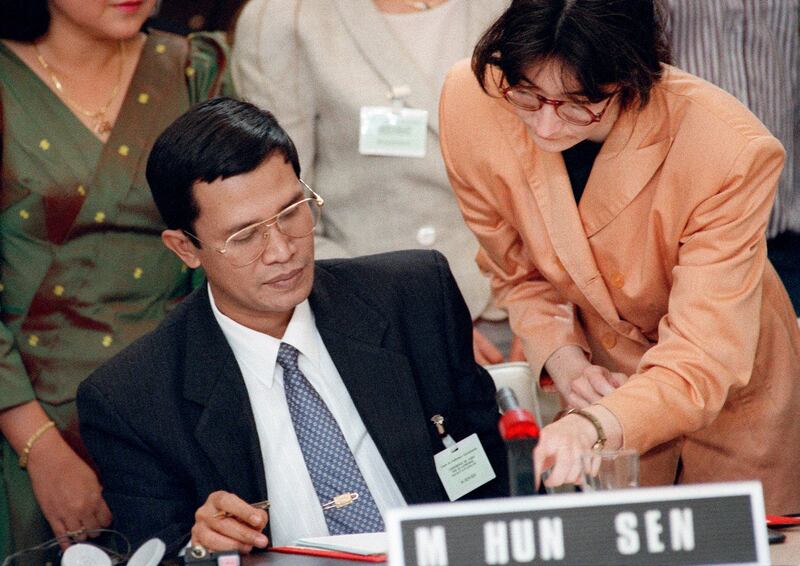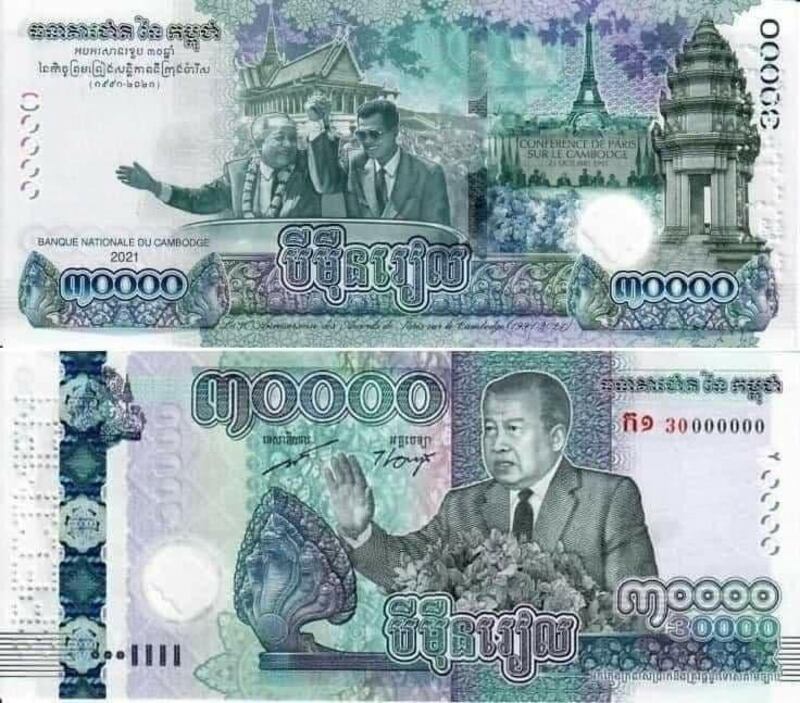Protesting wives of jailed politicians were roughed up by police in the Cambodian capital Phnom Penh, while hundreds of exiles from the country rallied in Washington Friday, demanding that their government uphold the 1991 pact that ended war in the country and promised democratic freedoms and human rights.
The Paris Peace Accords, signed by the United Nations and 19 countries on October 23, 1991, ended the Cambodian-Vietnamese War and helped rebuild a country ravaged by that conflict and the genocidal late 1970s rule of the Khmer Rouge, while also providing democratic rule with a constitution and elections. The accords also set up an international tribunal to try Khmer Rouge leaders for genocide and other crimes.
The 20 women protesting at the French Embassy in Phnom Penh were demanding that peace talks host Paris pressure Prime Minister Hun Sen and his increasingly autocratic government to return to compliance with the accord.
“The Paris Peace Accords signatories promised to protect and strengthen democracy in Cambodia. But Cambodia has totally lost its democracy and pluralism,” one of the women told RFA’s Khmer Service.
The 20 women were part of a group called the “Friday Women,” who often brave rough police treatment to protest for the release of their detained husbands and sons, victims of a sweeping crackdown on the opposition Cambodia National Rescue Party (CNRP) and most major players in civil society.
Police -- who outnumbered the women five to one -- seized banners, pushed some of the women to the ground, and stepped on them to hold them down, injuring several. National Police spokesman Chhay Kim Khoeun refused to comment on the incident.
Crushing a protest that should have been protected by the Paris pact is just the latest evidence that “Hun Sen’s government has now diminished those guarantees to absolutely nothing,” said Phil Robertson, Deputy Asia director for the New York-based Human Rights Watch.
“Basic civil and political liberties are endangered across the country and Hun Sen has reduced the Paris Peace agreement to a shadow of what it was supposed to be by creating a Cambodia that is neither democratic nor rights respecting,” he said in a statement.
In Washington, about 200 people gathered on Capitol Hill to commemorate the 1991 signing. They urged Hun Sen to respect the accords, but also called on the U.S. Congress to enact sanctions against Hun Sen’s regime.
The election in 1993, held under the auspices of the United Nations Transitional Authority in Cambodia (UNTAC), was contested by multiple political parties.
The most recent election, in 2018, came a year after Cambodia’s supreme court beholden to Hun Sen banned the CNRP, and his ruling party won all 125 seats in parliament.
“Cambodia can no longer be considered a multi-party democracy,” Sorpong Peou, a Cambodian scholar from Canada’s Ryerson University, told a panel at the U.S. Institute of Peace, an institution funded by Congress.
“There has been the transition backward to a one-party democracy with elections held without any credible opposition parties in the last election,” he added.

Ariel Eckblad, Deputy Assistant Secretary of State for Conflict and Stabilization Operations, said the country had achieved notable economic and social development, but that much of the progress made under the accords had been erased in recent years.
“Rather than realizing the competitive multiparty democracy envisioned 30 years ago, today Cambodia is witnessing increased repression and democratic backsliding,” she said.
Speaking at the same Washington panel, Chum Sounry, Cambodia’s ambassador to the U.S. said Cambodia has been “well on track,” since UNTAC’s mission ended in 1993.
He denied that the government restricts civil and political rights, saying, “the space for a free political environment remains in Cambodia for citizens who respect the law.”
On Thursday, U.S. lawmakers announced a resolution blaming the mixed record of the Paris accords on “Cambodian Prime Minister Hun Sen’s violations of Cambodia’s Constitution and effective one-party rule since 1993.”
Sen. Ed Markey, a resolution co-sponsor, said the U.S. must lead work to “halt the current assault on democracy by demanding that Prime Minister Hun Sen hold free and fair elections, drop politically motivated charges against political opponents, and respect Cambodia’s constitutional commitment to neutrality.”
A former Khmer Rouge commander who defected to occupying Vietnamese forces in 1977, the 69-year-old Hun Sen has ruled Cambodia since 1985, six years before Paris pact.
In 1997, Hun Sen staged a coup against his coalition partner in the government established by the first post-war elections, Norodom Ranariddh, son of the late King Norodom Sihanouk.
Adding insult to injury to many Cambodians who see him as the spoiler of Paris accords, the government issued a new 30,000-riel (U.S. $ 7.35) bank note to commemorate the accords, with images of Hun Sen and Sihanouk.

International watchdog groups that monitor justice, corruption, civil liberties and press freedom all give Hun Sen’s government low marks.
The World Justice Project, a Washington-based independent group that promotes rule of law, ranked Cambodia next to last -- ahead only of Venezuela -- in its global Rule of Law Index for 2021, while anti-graft watchdog Transparency International ranked the country 160th out 180 countries in its Corruption Perceptions Index for 2020.
The U.S.-based Freedom House’s annual Freedom in the World index rated Cambodia “not free,” with dismal political and civil liberty rankings that tied it with Djibouti for 165th.
And Reporters Without Borders (RSF) ranked Cambodia 144th among 180 countries in its 2021 World Press Freedom Index.
Sophal Ear of the Thunderbird School of Global Management at Arizona State University said Cambodia deserves equally dismal marks in implementing the Paris Peace Accords.
“It will provide for periodic and genuine elections. It will provide for the right to vote and to be elected by universal and equal suffrage. It will provide for voting by secret ballot, with a requirement that electoral procedures provide a full and fair opportunity to organize and participate in the electoral process,” said Ear, reciting key Paris provisions.
“Cambodia is today further from these objectives than it was in 2013 or 1993.”
Reported by RFA’s Khmer Service. Translated by Samean Yun. Written in English by Eugene Whong.
